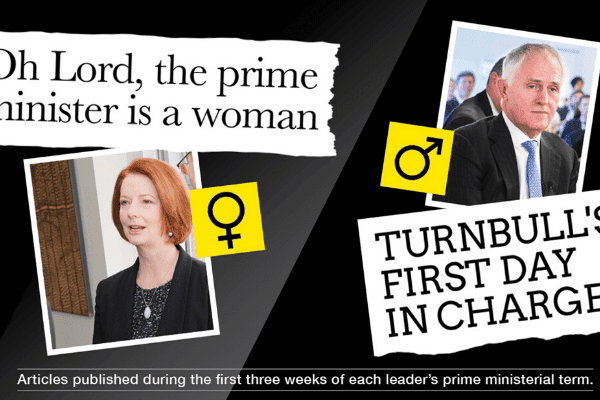Researcher, political scientist and writer Blair Williams explored ‘gendered media’ in her doctoral thesis of women prime ministers within English-speaking Westminster democracies including Australia, NZ and the U.K.
Williams, who travelled to Wellington and London for her research, said that gender-constrictive media lens is not improving.
“The media coverage of women prime ministers focuses on their gender and appearance in stories instead of examining their work as prime minister or the kind of leadership they show.”
“The media treat these leaders as if they were celebrities, focusing on their fashion and style as if they were on a run-way. It’s very incessant, many stories focus on their personal life, which distracts from the political messages at hand.”
"It's getting worse not better", says #ANUExpert @BlairWilliams26 on media coverage of female prime ministers' gender & appearance. "The media treat these leaders as if they were celebrities, focusing on their fashion & style as if they were on a run-way." https://t.co/pBttCZ2Rhb pic.twitter.com/g6wveleaTC
— ANU Media (@ANUmedia) February 25, 2020
Williams analysed a representative sample of more than a thousand mainstream newspaper articles on Margaret Thatcher, Theresa May, Julia Gillard, Jenny Shipley and Helen Clark. The articles were published during the first three weeks of each leader’s prime ministerial term.
“There’s a finite amount of space in media coverage and if time is being focused on their gender what are we missing out on?” Williams said.
Williams, who completed her PhD research under the supervision of Emeritus Professor Marian Sawer, is also a regular federal political correspondent for Radio Adelaide and currently sits on the Executive Board of the International Political Science Association (IPSA) Research Committee on Gender Politics and Policy (RC 19).
Former Prime Minister Julia Gillard, who was in office between 2010-2013, spoke to Williams as part of the researcher’s study, and said she believes future female politicians deserve better support.
“Better understanding of how gendered media coverage distorts our view of women leaders is pivotal to fixing the problem and encouraging more women to pursue a career in politics,” Gillard said.
Williams’ research also uncovered some surprising truths, including that women’s rights and political representation (by numbers) has in fact, improved. Despite this, the media’s optics have on the whole, chosen to highlight the gendered differences of women who have held positions of authority that have historically been held by men.
“Even though Margaret Thatcher was from a period where there were far less women in politics, only 34 per cent of newspaper articles emphasised her feminine traits, while this was present in 51 per cent of articles for Julia Gillard and 52 per cent for Theresa May,” Williams said.
“I found that the media coverage was more frequent and intense for Theresa May and Julia Gillard than it was for Thatcher. This negatively impacts women in politics as they always have to consider how their appearance, gender and personal life might be portrayed in the media, which can lead to self-limiting behaviours to try and navigate this.
“However, they risk being seen as less sincere and even ‘robotic’, as was the case for Theresa May, and might find it harder to click with the electorate.”
The academic version ^
The short and non-paywall version is here: https://t.co/4XxYvZRQzb
— Dr Blair Williams🏳️🌈♀️ (@BlairWilliams26) February 25, 2020
In 2020, Williams is busy teaching, writing journal articles (at the moment, she’s penning a piece comparing New Zealand’s treatment of Helen Clark to Australia’s treatment of Julia Gillard, and another comparing Theresa May and Margaret Thatcher) as well as preparing a book proposal.
“In the last decade, the changing media landscape has seen coverage that is more personalised, focusing on PM themselves,” Williams told me over the phone.
“Due to the rise of social media and the 24 hour news cycle, as well as easy access to media, the way Prime Ministers are presented has altered. Journalists have less time, less money, there are less editors, less checks and balances. Social media influences are creating a more informalised media culture.”
During her research on Margaret Thatcher while in London, Williams found that coverage in the 70s and 80s was “extremely formal.”
“Now it’s more ‘tabloidised’,” she said. “It’s less overly respectful.”
I asked Williams what needs to change for things to improve.
“We need more women in political leadership positions. We need to have so many women that it is no longer a talking point. Where we don’t have to say ‘woman prime minister.’ We never say ‘women teacher’ or ‘women nurse.’ Stating an individual’s gender makes their gender a point of difference.”
Williams believes that the media needs to change its journalistic practices, despite the dwindling budgets, which she acknowledges.
“At every level of the media world, from journalists to the editors, it’s important to not rely on gender stereotypes.”


